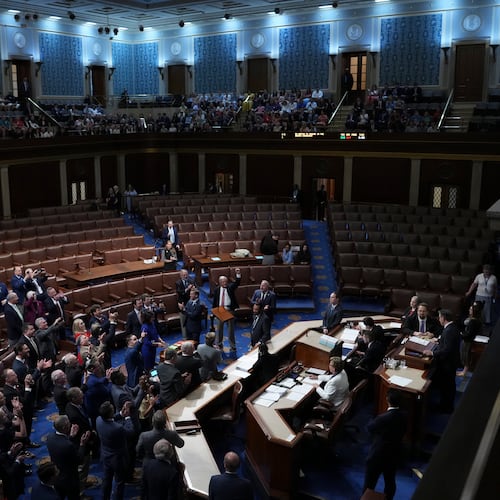Today, the War Powers Act confronts its moment of truth. Friday marks the 60th day since President Barack Obama told Congress of his Libyan campaign. According to the act, that declaration started a 60-day clock: If Obama fails to obtain congressional support for his decision within this time limit, he has only one option — end American involvement within the following 30 days.
Obama has not only failed, but he hasn’t even tried — leaving it to Sen. Richard Lugar, the ranking Republican on the Foreign Relations Committee, to call for a “specific resolution that would give the president authority.” Neither the president nor the Democratic congressional leadership has shown any interest. They have been sleepwalking their way to Day 60.
Obama’s politics of silence contrast sharply with clear and consistent legal pronouncements of the executive branch. Richard Nixon vetoed the act in 1973, precisely because it imposed restraints on presidential warmaking. But two-thirds of both houses of Congress overrode his veto, and the presidency soon fell into line. Jimmy Carter’s Justice Department expressly affirmed the constitutionality of the 60-day clock in 1980 — and its verdict has not been challenged by executive-branch lawyers.
Obama has continued this tradition. His March 21 letter to Congress telling of the Libyan campaign stated that it was “consistent with the War Powers Resolution.” And his Justice Department issued an opinion that acknowledged the 60-day rule without questioning its constitutionality.
Why, then, hasn’t the president been pressing Congress to approve the war before the looming deadline? Because it’s easier to paper over the problem with new legal fictions pretending that the time limit doesn’t apply to this instance. By today, the administration’s legal team is likely to announce that the clock stopped ticking on April 1 — the date when NATO “took the lead” in the bombing campaign. Since NATO is running the show, the argument will go, the War Powers Act no longer applies, and the president doesn’t have to go back to Congress after all.
But American planes and drones continued their bombing long after the April turnover — and the drones are still flying over Libya. Since the cost of the mission is at three-quarters of a billion dollars and climbing, it is sheer fiction to suggest that we are no longer a vital player in NATO’s “Operation Unified Protector.”
This is especially so when an active-duty American officer remains at the top of NATO’s chain of command. As supreme allied commander, Adm. James Stavridis “leads all NATO military operations.” While a Canadian air force general, Charles Bouchard, is in charge of the Libyan campaign, the buck doesn’t stop with him but with Stavridis, who also reports to the Pentagon as head of the U.S. European command. Even if American drones discontinue their operations before the deadline, an American admiral will still be in a position to call the shots.
This is no accident. NATO has been a key vehicle for American military interests since the 1950s. It would create a terrible precedent to pretend otherwise. Once Obama crosses the Rubicon, future presidents will simply cite Libya when they unilaterally commit America to far more ambitious NATO campaigns.
Make no mistake: Obama is breaking new ground, moving decisively beyond his predecessors. George W. Bush gained congressional approval for his wars in Afghanistan and Iraq. Bill Clinton acted unilaterally when he committed American forces to NATO’s bombing campaign in Kosovo, but he persuaded Congress to approve special funding for his initiative within 60 days. And the entire operation ended on its 78th day.
In contrast, Congress has not granted special funds for Libya since the bombing began, and the campaign is likely to continue beyond the 30-day limit set for termination of all operations.
Since the House of Representatives is out of session this week, Congress can’t approve the operation before today’s deadline. But under the expedited procedures specified by the act, speedy congressional approval is feasible next week.
If nothing happens, history will say that the War Powers Act was condemned to a quiet death by a president who had solemnly pledged, on the campaign trail, to put an end to indiscriminate warmaking.
Bruce Ackerman and Oona Hathaway are professors of law and political science at Yale University.
About the Author
Keep Reading
The Latest
Featured


